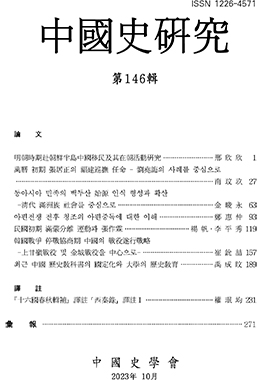China realized the limitations of continuously waging war after the 5th large-scale campaign, and attempted to change the way it conducted the campaign. The purpose of this study is to examine changes in China's national security goals and military strategy as it participated in the armistice negotiations, and from what perspective it conducted major campaigns. In particular, the analysis focused on the Sanggamryeong Campaign in 1952 and the Geumseong Campaign in 1953, which were a period of stalemate in armistice negotiations.
After the 5th large-scale campaign of the Korean War, China began to view the nature of the Korean War as an international war. At this time, China's national security goal was to keep North Korea alive and form a buffer zone with the United States. China's military strategy was an active defense strategy, and the goal was to secure the 38th parallel and end the war or ceasefire through negotiations. To this end, the Chinese and North Korean troops attempted to defend the 38th parallel and the east and west coasts through coordinated operations. The military means included the reinforced defense zone around the 38th parallel, defense units on the east and west coasts, and Chinese troops that could be deployed to the Korean Peninsula through rotation operations. The Sanggamryeong campaign and the Geumseong campaign were operational phases linked to these national security strategic goals and military strategy. According to the active defense strategy, the Sanggamryeong campaign was a campaign that expanded from a tactical level battle to an operational level. The operational goal was expanded to kill a large number of U.S. troops in the battle to secure the two hills occupied by the initial company size. This campaign was the first time in history that the Chinese military combined mine defense and counterattack to destroy enemy units, unlike before. The goal of the operation throughout Geumseong was to oppose Seungman Rhee's armistice agreement, and to force the Chinese military to force Seungman Rhee to agree to the armistice agreement through strong military action.


